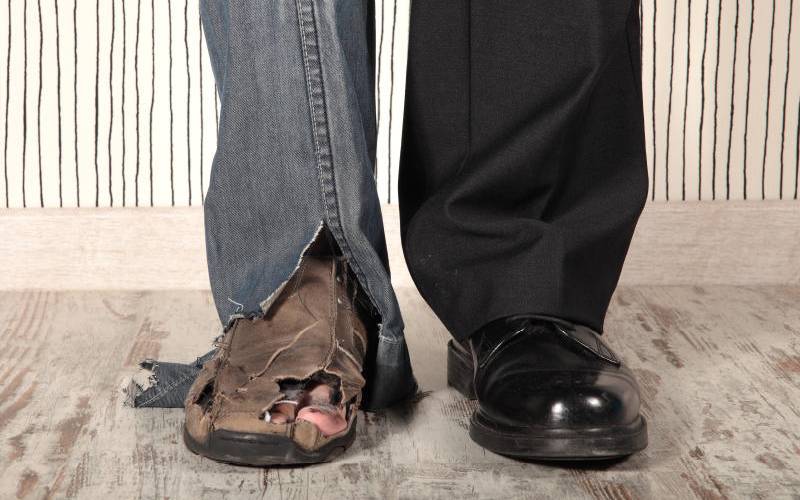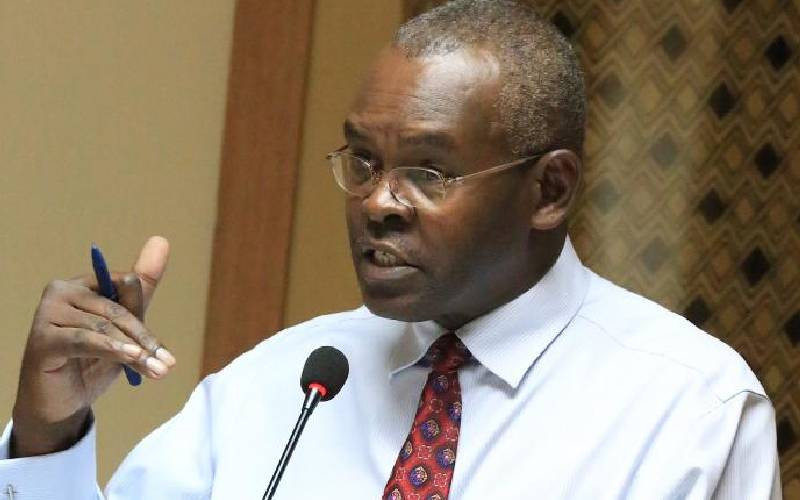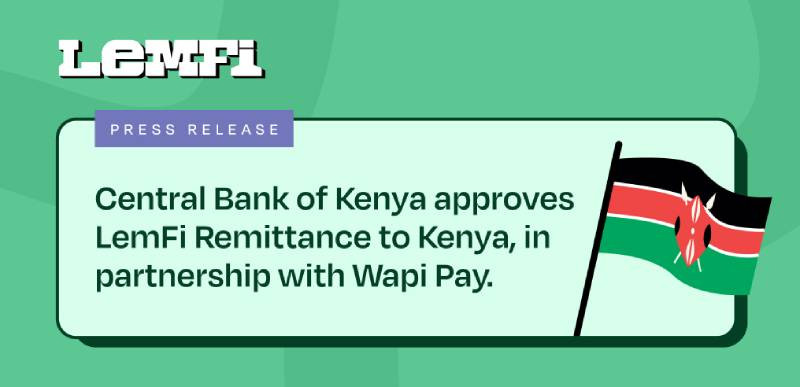
The Covid-19 pandemic has exposed a deep fissure between the haves and have-nots or hustlers, if you like.
A few in the upmarket areas of Nairobi and other major towns are incensed with the novel coronavirus pandemic for denying them an opportunity to splurge.
The virus has put paid to their plans to travel first-class around the world for business or leisure, shopping for expensive houses, posh cars and paintings.
Then there are the hustlers in the downtown. A lot of them are cursing the pandemic for stripping them of their dignity, denying them an opportunity to earn a living, to survive, to put food on the table and maintain roofs over their heads.
Incidentally, Kenya’s is a hustlers’ market. Dominant players in the market place are farmers, merchants, jua kali artisans, graphic designers, baby sitters, private school teachers, hawkers, barmaids, waiters, deejays, artists, house girls, journalists, doctors, dealers in electronics, general employees and airport taxi drivers.
Official figures show that 95.5 per cent of consumers in Nairobi spend less than Sh184,000 in a month.
Majority of Kenyans also do not have savings - they have either spent all their income or have invested their money in land and other properties. Data from CBK shows that of the 55.8 million bank account holders, 98 per cent have less than Sh100,000 as deposits.
But for a savvy investor eyeing the bond market, where currently therei s a high flow of cash, one must have a minimum of Sh100,000 to bid for Treasury Bill, a short-term Government paper.
So, for the majority of Kenyans and businesses with less than this amount to their credit, they are technically locked out from these high valued investments. The only option for them is M-Akiba, where one can invest as little as Sh3,000 for a return of 10 per cent or Sh300 annual earnings.
Yet, the majority of the businesses are on the death bed, while many households are struggling to pay rent.
Cost of living for the majority of Kenyans is on the rise, with people in some areas paying more than double what they used to pay for transport before Coronavirus.
Only a tiny, 3.5 per cent, of consumers in Nairobi who spend over Sh184,000 in a month and have over Sh100,000 are doing well.
But there is even more to the tale of the two markets.
While millions of hustlers are still grappling with how and when they will get their livelihoods back, those with loads of cash are snapping up blue-chip stocks at the Nairobi Securities Exchange (NSE), such as Safaricom’s and those of major banks.
Stay informed. Subscribe to our newsletter
They have also been trading in government securities.
“This bargain hunting is a classic example of how every economic crisis like this ends up making the rich richer and the poor poorer, especially in the West,” says Wohoro Ndoho, the chief executive of Euclid Capital and a former director general public debt management.
Ndoho reckons this holds true for property as well. “Imagine what you could get in the market right now if you had a lot of hard cash?”
Unfortunately, majority of Kenyans do not have hard cash. Millions of hotel, airline, pubs and nightclub workers have been laid off or furloughed, making it difficult for the victims to pay for essentials such as rent and food, according to recent surveys.
Thousands of small businesses are teetering on the brink of collapse and will urgently need State intervention to stay alive, according to the Central Bank of Kenya (CBK) Governor Patrick Njoroge.
Restrictive measures aimed at containing the spread of the disease, including partial lockdowns, a night curfew and ban on social gatherings, has significantly reduced transactions on automated teller machines (ATMs) as well as mobile payments, latest data from CBK shows.
In April, the first month that Kenyans lived under the stringent containment measures aimed at curbing the spread of Covid-19, the value of money transacted through debit cards, credit cards, point-of-sale (POS) machines like those used in supermarkets to read your debit or credit card, pre-paid cards declined by a third to Sh35.2 billion from Sh52.1 billion in March.
Year-on-year, this was a drop of 44.6 per cent compared to Sh63.6 billion that was transacted in April last year.
There were 125 million transactions, the lowest since August 2017 when there were 120 million mobile transactions.
Also, transactions using credit cards, a sort of debt offered by banks, were at a record low at 41,278 in April.
Consequently, the size of the economy is set to expand by the slowest rate since 2008 when the country was roiled in post-poll violence that saw over a thousand lives lost and property worth billions destroyed.
Most economic forecasters do not expect the national output to increase by more than two per cent compared to 5.4 per cent last year.
Scholastica Odhiambo, an Economics lecturer at Maseno University, said it was the fear of people dying that has caused the dismal performance of the economy rather than real economic factors.
“The investors with big money are the ones speculating an economic turnaround,” said Odhiambo.
Like many other analysts, XN Iraki, a business lecturer at the University of Nairobi, says this decoupling of the stock market and the economy is not unique to Kenya.
Even developed markets like the United States of America, he said, are also experiencing a surge in stock prices.
“In Kenya, there is no disconnect between the stock market and economy; the stock market is anticipating the return to normalcy as the economy opens up,” explained Iraki, giving the example of increased traffic jams.
“The stock prices are factoring the expectations that the economy will turn round and grow despite Covid-19.”
For his part, Churchill Ogutu, a research analyst at Genghis Capital, does not reckon the performance of the stock market can be a pulse of the economy. “First, the stock market is heavily skewed towards telecommunications and banking sectors, which account for 80 per cent of the market capitalisation,” said Ogutu. Market capitalisation is the total wealth of the stock market.
However, in the real economy, it is agriculture that takes the lion’s share, while trade and private households are the largest recipients of private sector credit, according to Ogutu.
“These sectors on the real economy occupy insignificant proportions in the stock market,” he said.
While most leading economic indicators have shown that the economy is sluggish, with fewer goods and services being exchanged, the capital market has shaken off the initial shock and is now experiencing what is known as a bull run - a period when stock prices rise.
In April, when the economy was going through a tumultuous time as the containment measures were implemented, traders at the NSE were busier than they were in a similar period last year.
There were more transactions at the NSE; shares traded increased by close to 50 per cent to 439 million, compared to the same month last year.
The value of shares traded increased to Sh12.6 billion compared to Sh9.8 billion in April 2019. Only the NSE-20 Share Index, which tracks the performance of blue-chip companies, was doing badly.
Trading of bonds, a kind of security, has been tapering off as the initial fear of volatility in the equities market among investor wears off.
However, the turnover of bonds has been increasing. The volume of bonds traded in the domestic secondary market rose by 10.66 per cent during the week ending June 20, according to CBK data.
And things will only get better for the bond market, with investors rushing to put their money in government securities as indicated by the over-subscription of the recently auctioned Treasury bills and bonds.
In an auction for a five and 10-year Treasury bonds (T-bonds) that CBK reopened, liquid investors lent to the government Sh105 billion against an offer of Sh40 billion, representing a performance rate of 262 per cent.
The five-year bond, with a maturity date of December 9, 2024, received bids worth Sh60.9 billion, while the 10-year bond attracted total bids of Sh44.2 billion.
Close to half of the bids (Sh49 billion) were accepted, with the government expected to pay an interest of 11.49 per cent for the five-year T-bond and 12.28 for the 10-year bond that will mature on November 12, 2029.
It was the same with the short-term government paper (T-bills), which were offered in the last two weeks.
Cash-rich investors opted to put their money in the short-term government securities despite diminishing returns, with the 91-day T-bill offered on June 22 oversubscribed by more than three times.
CBK, the fiscal agent for National Treasury, received bids worth Sh13.4 billion for the three-month government paper. This was against an offer of Sh4 billion.
The high subscription comes against a backdrop of declining yields, an indicator that investors are after the security offered by government securities more than returns.
Investors will get a return of 7.089 per cent on the T-bill compared to 7.25 per cent that was given for the 91-day paper auctioned last week.
A good chunk of this money is coming from payment by the government following the settlement of part of the pending bills, VAT refunds and payment of interest on debt.
Benchmark rate
Liquidity has also been boosted by the decision by CBK to cut its benchmark lending rate to seven per cent, which has provided cheap cash to lenders. CBK also cut Cash Reserve Ratio, a fraction of customer deposits banks are supposed to leave with CBK, freeing up Sh35.2 billion, which banks are to lend to borrowers distressed by the Covid-19 pandemic.
As a result of increased liquidity, the interbank rate, or the rate at which banks lend to each other overnight, dropped to 11-month low of 2.34 per cent.
However, with banks putting their money in government securities, this rate has risen to 4.34 per cent, the highest since May 20.
A high inter-bank rate means banks will have difficulty getting money to lend, defeating the government’s efforts of stimulating the economy by encouraging private sector borrowing.
This money is supposed to go to the downtown market. True, private sector credit grew by nine per cent in April, handing a lifeline to struggling businesses and households, but the hustlers’ market is far from the boom at the stock market.
Both Ndoho and Iraki agree that it is possible that the stimulus money is going into bonds and equities rather than into the goods and services market.
Iraki said the reason some of the stimulus money was going into financial assets was because they were safer and one did not struggle to invest in them.
“Under Covid-19 uncertainty, no one wants to take risks. For equities, the anticipated rise in prices builds its own momentum,” he said.
According to Iraki, it is not a bad thing if the money saved from tax exemptions and tax cuts, amounting to over Sh172 billion in the current financial year, is going to equity and government securities.
 The Standard Group Plc is a
multi-media organization with investments in media platforms spanning newspaper
print operations, television, radio broadcasting, digital and online services. The
Standard Group is recognized as a leading multi-media house in Kenya with a key
influence in matters of national and international interest.
The Standard Group Plc is a
multi-media organization with investments in media platforms spanning newspaper
print operations, television, radio broadcasting, digital and online services. The
Standard Group is recognized as a leading multi-media house in Kenya with a key
influence in matters of national and international interest.
 The Standard Group Plc is a
multi-media organization with investments in media platforms spanning newspaper
print operations, television, radio broadcasting, digital and online services. The
Standard Group is recognized as a leading multi-media house in Kenya with a key
influence in matters of national and international interest.
The Standard Group Plc is a
multi-media organization with investments in media platforms spanning newspaper
print operations, television, radio broadcasting, digital and online services. The
Standard Group is recognized as a leading multi-media house in Kenya with a key
influence in matters of national and international interest.










